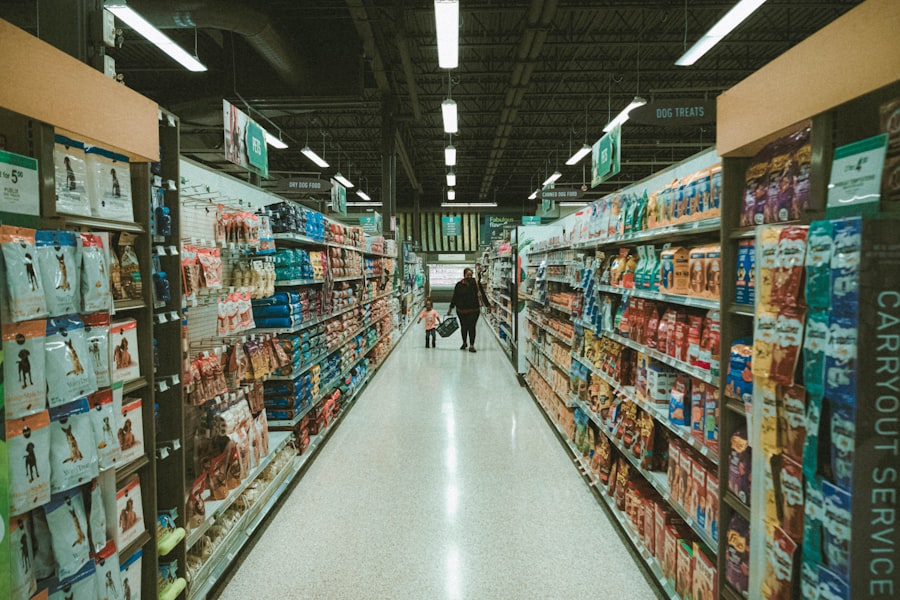You may have noticed the undeniable appeal of cheap groceries. The bright, colorful aisles of discount supermarkets beckon you with promises of savings and convenience. In a world where every penny counts, the temptation to fill your cart with low-cost items is hard to resist.
You might find yourself drawn to the idea that you can stretch your budget further, allowing for more discretionary spending elsewhere. However, as you navigate these aisles, it’s essential to consider what lies beneath the surface of those enticing prices. While the immediate benefits of cheap groceries are clear, the broader implications are often overlooked.
You might be surprised to learn that the low prices you enjoy come at a cost that extends far beyond your wallet. From the farmers who grow your food to the environmental impact of mass production, the allure of cheap groceries is intertwined with a complex web of consequences. As you delve deeper into this topic, you may begin to question whether the savings are worth the hidden costs.
Key Takeaways
- Cheap groceries may be alluring, but they come with hidden costs and consequences.
- Farmers and producers are negatively impacted by the pressure to keep prices low.
- The environmental toll of cheap groceries includes increased carbon emissions and deforestation.
- Cheap, processed foods can have detrimental effects on public health.
- The food industry often exploits labor in order to keep prices low.
The impact on farmers and producers
When you purchase cheap groceries, it’s crucial to recognize the impact on farmers and producers who work tirelessly to bring food to your table. Many small-scale farmers struggle to compete with large agribusinesses that dominate the market. These corporations often benefit from economies of scale, allowing them to produce food at a fraction of the cost.
As a result, local farmers may be forced to lower their prices or even abandon their farms altogether, leading to a decline in agricultural diversity and local food systems. You might also consider how these low prices affect the quality of the food you consume. In an effort to cut costs, many producers resort to practices that prioritize quantity over quality.
This can lead to the use of harmful pesticides, genetically modified organisms, and other practices that compromise the integrity of the food supply. As a consumer, you may inadvertently support a system that prioritizes profit over sustainable farming practices, ultimately undermining the very foundation of your food security.
The environmental toll of cheap groceries

The environmental consequences of cheap groceries are profound and far-reaching. When you opt for low-cost food items, you may not realize that these products often come from industrial farming operations that prioritize efficiency over ecological health. The heavy use of fertilizers and pesticides in these systems can lead to soil degradation, water pollution, and loss of biodiversity.
As you enjoy your affordable meals, consider the hidden environmental costs associated with their production. Moreover, the transportation involved in bringing cheap groceries to your local store contributes significantly to greenhouse gas emissions. Many of the products you purchase have traveled thousands of miles from their source, resulting in a substantial carbon footprint.
You might find it eye-opening to learn that the convenience of cheap groceries often comes at the expense of our planet’s health. By choosing locally sourced and sustainably produced foods, you can help mitigate these environmental impacts and support a more sustainable food system.
The health implications of cheap, processed foods
| Health Implications | Cheap, Processed Foods |
|---|---|
| Obesity | High consumption linked to obesity due to high levels of sugar, fat, and calories |
| Heart Disease | Processed foods often contain high levels of trans fats and sodium, leading to increased risk of heart disease |
| Diabetes | High sugar content in processed foods can contribute to the development of type 2 diabetes |
| Nutrient Deficiency | Processed foods are often low in essential nutrients, leading to deficiencies in vitamins and minerals |
| Cancer | Some processed foods contain additives and preservatives that may increase the risk of cancer |
As you fill your cart with inexpensive groceries, it’s essential to consider the health implications of consuming cheap, processed foods. Many low-cost items are heavily processed and laden with additives, preservatives, and unhealthy fats. These ingredients may enhance flavor and shelf life but can also contribute to various health issues, including obesity, diabetes, and heart disease.
You might be surprised to discover that what seems like a bargain could have long-term consequences for your well-being. Additionally, the marketing strategies employed by companies producing cheap processed foods often target vulnerable populations, making it easy for you to overlook healthier options. The convenience and affordability of these products can create a cycle of dependency on unhealthy eating habits.
As you navigate your grocery choices, it’s vital to prioritize whole foods and nutritious options that nourish your body rather than simply filling your stomach.
The exploitation of labor in the food industry
The quest for cheap groceries often leads to the exploitation of labor within the food industry. Behind every low-priced item lies a workforce that is frequently underpaid and overworked. Many agricultural workers endure grueling conditions for meager wages, often lacking basic rights and protections.
As you enjoy your meals, it’s important to recognize that these workers are integral to the food supply chain yet often remain invisible in discussions about food pricing. You may also want to consider how this exploitation extends beyond agriculture into processing and distribution. Workers in factories and warehouses often face unsafe working conditions and long hours for minimal pay.
By supporting cheap grocery chains, you may inadvertently contribute to a system that prioritizes profit over people. It’s worth reflecting on how your purchasing decisions can either perpetuate or challenge these injustices within the food industry.
The consequences of food waste in the quest for cheap groceries

In your pursuit of affordable groceries, you might not realize the staggering amount of food waste generated by this system. Discounted items often lead consumers to buy more than they need, resulting in excess food that ultimately ends up in landfills. This waste not only represents a loss of resources but also contributes significantly to greenhouse gas emissions as decomposing food releases methane into the atmosphere.
You may find it alarming that while you seek savings at the grocery store, your choices could be contributing to a larger environmental crisis. Moreover, the culture surrounding cheap groceries often encourages a throwaway mentality. With prices so low, it can be easy to disregard expiration dates or buy items without considering whether you will actually use them.
As you reflect on your shopping habits, consider adopting strategies that minimize waste—such as meal planning or buying only what you need—to help combat this issue and promote a more sustainable approach to food consumption.
The hidden costs of transportation and distribution
When you think about cheap groceries, it’s essential to consider the hidden costs associated with transportation and distribution. Many low-priced items are sourced from distant locations, requiring extensive logistics networks to deliver them to your local store. This process not only contributes to increased carbon emissions but also raises questions about the sustainability of such practices.
You might be surprised to learn that while you save money at checkout, the environmental toll of transporting goods can be significant.
When products are shipped from far away, they may spend extended periods in transit, impacting freshness and nutritional value.
As you shop for groceries, consider supporting local producers who prioritize shorter supply chains and fresher products. By doing so, you can help reduce transportation-related emissions while enjoying higher-quality food.
The social and economic impact on local communities
The prevalence of cheap grocery chains can have profound social and economic effects on local communities. As large corporations dominate the market with their low prices, small businesses often struggle to compete and may ultimately close their doors. This loss not only affects local economies but also diminishes community identity and cohesion.
You might find it disheartening to realize that while you save money on groceries, your choices could contribute to the decline of local businesses that provide unique products and services. Furthermore, the presence of discount grocery stores can lead to a homogenization of food options within communities. With an emphasis on low-cost items, diverse cultural foods may become harder to find as smaller ethnic markets close down.
As you navigate your grocery shopping experience, consider how supporting local businesses can foster community resilience and preserve cultural diversity within your area.
The ethical considerations of supporting cheap grocery chains
As you weigh your options at the grocery store, it’s essential to reflect on the ethical considerations surrounding cheap grocery chains. While saving money is undoubtedly appealing, it’s crucial to consider who bears the burden of those low prices. From exploited laborers to environmentally damaging practices, supporting these chains can perpetuate systems of inequality and harm.
You might find it worthwhile to explore alternative shopping options that align with your values and promote ethical practices within the food industry. Moreover, by choosing to support businesses that prioritize fair trade, sustainable sourcing, and local production, you can contribute to a more equitable food system. Your purchasing decisions have power; they can either reinforce harmful practices or support positive change within communities and industries alike.
As you shop for groceries, take a moment to consider how your choices reflect your values and impact those around you.
The long-term effects on food security and sustainability
The long-term effects of relying on cheap groceries extend beyond individual choices; they have significant implications for food security and sustainability as well. When consumers prioritize low prices over quality and sustainability, they inadvertently contribute to a system that undermines local agriculture and biodiversity. This reliance on industrial farming practices can lead to decreased resilience in food systems, making communities more vulnerable to disruptions caused by climate change or economic shifts.
You may find it concerning that as we continue down this path of prioritizing cheap groceries over sustainable practices, we risk jeopardizing future generations’ access to nutritious food. By advocating for sustainable agriculture and supporting local producers, you can play a role in fostering a more resilient food system that prioritizes both people and the planet.
Rethinking the true cost of cheap groceries
As you reflect on your grocery shopping habits, it’s essential to rethink what cheap groceries truly cost—not just in terms of dollars but also in terms of social justice, environmental health, and community well-being. While saving money is undoubtedly important in today’s economy, it’s crucial to recognize that every purchase carries implications far beyond your immediate budgetary concerns. By making conscious choices about where and how you shop for groceries, you can contribute to a more equitable and sustainable food system.
Whether it’s supporting local farmers’ markets or choosing ethically sourced products, your decisions matter. As you navigate the aisles filled with tempting bargains, take a moment to consider not just what’s in your cart but also what kind of world you want to support with your purchases. In doing so, you can help create a future where good food is accessible for all—without compromising our planet or our communities along the way.
In exploring the intricate dynamics of consumer spending, “The Hidden Cost of Cheap Groceries” sheds light on the often-overlooked consequences of prioritizing low prices over quality and sustainability. A related article that delves deeper into the broader implications of economic choices is available on the How Wealth Grows website. This article provides valuable insights into how our purchasing decisions can impact not only our personal finances but also the larger economic landscape. For a more comprehensive understanding, you can read the related article by visiting howwealthgrows.
com/’>How Wealth Grows.
FAQs
What are the hidden costs of cheap groceries?
The hidden costs of cheap groceries include environmental degradation, exploitation of labor, and negative impacts on public health.
How does the production of cheap groceries contribute to environmental degradation?
The production of cheap groceries often involves unsustainable farming practices, deforestation, and excessive use of pesticides and fertilizers, leading to soil degradation, water pollution, and loss of biodiversity.
What are the labor exploitation issues associated with cheap groceries?
Cheap groceries are often produced by underpaid and exploited laborers, including migrant workers and those in developing countries, who work in poor conditions and lack job security and fair wages.
How do cheap groceries affect public health?
Cheap groceries are often highly processed and contain high levels of unhealthy additives, preservatives, and artificial ingredients, contributing to the rise of diet-related diseases such as obesity, diabetes, and heart disease.
What are some ways to address the hidden costs of cheap groceries?
Addressing the hidden costs of cheap groceries requires supporting sustainable and ethical food production practices, promoting fair labor standards, and advocating for policies that prioritize public health and environmental sustainability.
